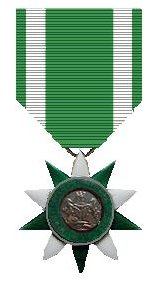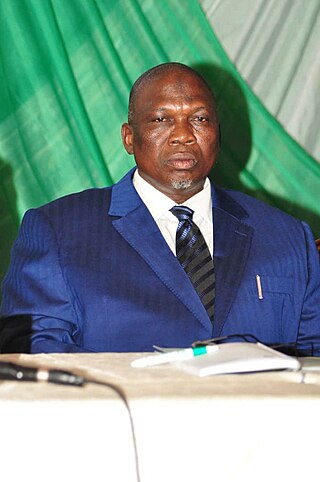
Chief Obafemi Jeremiah Oyeniyi Awolowo was a Nigerian nationalist and politician who played a key role in Nigeria's independence movement (1957–1960). Awolowo founded the Yoruba nationalist group Egbe Omo Oduduwa, and was the first Leader of Government Business and Minister of Local Government and Finance, and first Premier of the Western Region under Nigeria's parliamentary system, from 1952 to 1959. He was the official opposition leader in the federal parliament to the Balewa government from 1959–1963.

Obafemi Awolowo University (OAU) is a federal university in Ile-Ife, Osun State, Nigeria. The university was founded in 1961 and classes commenced in October 1962 as the University of Ife by the regional government of Western Nigeria, which was led by Samuel Ladoke Akintola. It was renamed "Obafemi Awolowo University" on 12 May 1987, so by the Ibrahim Badamasi Babangida led military administration, in honour of Obafemi Awolowo (1909–1987), the first premier of the Western Region of Nigeria, who initially thought of the idea of establishing the university.
Chief Theophilus Adeleke Akinyele was a Nigerian business consultant and civil servant.
The National Security Organization (NSO) of Nigeria, or Nigerian Security Organization, was created under Decree number 27 of 1976 by the military regime of General Olusegun Obasanjo, after the failed Dimka coup which claimed the life of former Head of State General Murtala Mohammed. The NSO was given a mandate of co-ordinating Internal Security, Foreign Intelligence and counterintelligence activities. It was charged with the detection and prevention of any crime against the security of the state, with the protection of classified materials, and with carrying out any other security missions assigned by the president.
Abdul Azeez Kolawole Adeyemo, popularly known as 'Alhaji how are you', was a Nigerian and prominent Yoruba politician. He was born in Ado-Ekiti the Ekiti State capital to Sir. Rufai Adeyemo & Princess Adebolarin Agunsoye. Growing up as a Catholic during the British colonial era, he later converted to Islam. He became a politician early in his career. He joined the Western Region campaign of Egbe Omo Oduduwa founded by Chief Jeremiah Obafemi Awolowo. He was also a front-line member of Action Group political party which later metamorphosed into Unity Party of Nigeria. His main legacy was to secure democracy and good governance in post independent Nigeria.

Chief Victor Babaremilekun Adetokunboh Fani-Kayode, Q.C., SAN, CON was a leading Nigerian politician, aristocrat, nationalist, statesman and lawyer. He was elected deputy premier of the Western Region of Nigeria in 1963 and played a major role in Nigeria's legal history and politics from the late 1940s until his death in 1995.
Chief Sunday Afolabi was a Nigerian politician who served in the cabinet of President Olusegun Obasanjo as Minister of Internal Affairs from 1999 to 2003. He also served as Minister of Education in the cabinet of President Shehu Shagari from 1982 to 1983. He previously served as deputy governor of Oyo State from 1979 to 1982 under Governor Bola Ige.

Presidential elections were held in Nigeria for the first time on 11 August 1979. The result was a victory for Shehu Shagari, whose National Party of Nigeria had won the parliamentary elections in July.
Alhaji Abdurrahman Shugaba Darman (1920–2010) was a Nigerian politician from Borno State, and a contemporary of the late Sir Ahmadu Bello. Shugaba Darman was a founding member of the Great Nigeria People's Party and was elected as a member of the Borno State House of Assembly in 1979 where he also became the house Majority Leader.

The Order of the Federal Republic (OFR) is one of two orders of merit, established by the Federal Republic of Nigeria in 1963. It is senior to the Order of the Niger.
Chief Atanda Fatai Williams, was a Nigerian Jurist and Chief Justice of Nigeria from 1979 to 1983.

Chief Godwin Olusegun Kolawole Ajayi, SAN popularly known by his initials GOK Ajayi, was a prominent Nigerian lawyer.
Chief Samuel Obakayode "Kayode" Eso, CON, CFR was a prominent Nigerian jurist. He served as a Justice of the Supreme Court of Nigeria.
Nwali Sylvester Ngwuta, CFR was a Nigerian jurist and Justice of the Supreme Court of Nigeria. He served on the Supreme Court from 2011 until his death in 2021.
Mudiaga Odje was a Nigerian attorney and Senior Advocate of Nigeria who helped shape both the constitutional and legal systems of the Federal Republic of Nigeria.
Ahmed Kusamotu was a Nigerian lawyer who had a prominent political role as chairperson of the National Republican Convention during the late stages of the short-lived Third Republic.

Mohammed Suleiman Ambursa is a Nigerian jurist who is the Chief Judge of Kebbi State. He hails from Ambursa, Birnin Kebbi Local Government Area of Kebbi.
Alhaji Abubakar Garba Koko,, Sarkin Yakin Gwandu,, was a Nigerian civil servant, Administrator, and Politician who served as the first Executive Secretary of the Federal Capital Development Authority (FCDA), Abuja. He planned and executed the development of Nigeria's new federal capital in the 80s.
Amina Adamu Aliyu is a Nigerian judge from Kano State She was born in Kano Municipal Local Government Area of Kano State. She pursued her Bachelor of Laws at Ahmadu Bello University Zaria, graduating in 1986, and subsequently completed her legal training at the Nigerian Law School, being called to the bar in May 1989. Aliyu started her career as a state counsel in the Kano State Ministry of Justice in 1989, eventually rising to the position of Deputy Director Civil Litigation by 2009 when she became a High Court Judge. Notable cases include chairing the election petition tribunals in Kwara State in 2020 and Kebbi State in the 2019 Nigerian general election. Aliyu also presided over cases involving issues such as irregularities in the selection process of the Kano Emirate Throne and heinous crimes, delivering judgments that led to convictions and sentences.
The 2015 Delta State gubernatorial election was the 7th gubernatorial election of Delta State. Held on April 11, 2015, the People's Democratic Party nominee Ifeanyi Okowa won the election, defeating Great Ogboru of the LP.







